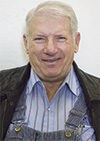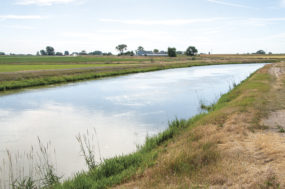The air conditioning was of the “two-70” type. Two windows open and 70 miles an hour. Problem was, we were driving into the sun crossing the Mountain Home, Idaho, desert toward Boise, the wind was blowing against us and the outside temperature was about 105ºF.
Earlier in the day, we had seen a dog chasing a cat. It was so hot they were both walking. The ice-cream truck had a police escort through the city park.
None of the stores bothered to put up their sign that stated “No shoes, no service” because the sidewalks were too hot to walk on barefoot.
I finally found a towel in the truck, soaked it in the ice water in the cooler and wrapped it around my neck.
Now I had some relief. Ice water dribbled down my back and over my chest. My blurry vision returned to normal and the scenery stopped floating all over.
Mother Nature must have been as hot as I had been that afternoon. We watched a thunderstorm develop in the distance ahead of us. By the time we got to Caldwell, Idaho, the thunderstorm had cooled off that part of the world and had pretty well dissipated.
When we arrived at Fruitland, Idaho, to unload the hay, the dairyman asked how wet the hay was. He was amazed that we missed the storm, since he had running water from it at his place.
One trip home from Portland, Oregon, I noticed that the oil pressure gauge in the Freightliner had stopped moving. It usually moved up and down as the engine of the truck sped up and slowed down.
Now it held a constant 57 pounds of oil pressure. I let off the throttle and pushed in the clutch to let the engine idle. No change. I proceeded toward home.
It was the middle of winter and I was crossing the Blue Mountains in Oregon, east of Pendleton. About every five miles there had been a stalled truck alongside the road, most with the amber lights of a service truck beside them.
I knew that the forecast had been for dangerously low cold temperatures and made sure I had enough anti-gel in my diesel fuel to keep my truck running. I had my sleeping bag wrapped around my legs and still had cold feet.
There was frost forming on the inside of the windows of the truck. When I finally got to Ontario, Oregon, it was warmer, and the inside of the windows thawed and the oil pressure gauge went back to normal. (This was a cab-over-engine truck and there was not much between the oil line that fed the oil pressure gauge and the sheet metal of the truck.
It just got so cold that the engine oil in the 1/8-inch line to the gauge had gelled.) In comparison to the temperatures on top of the Blues, Ontario felt like a heat wave. I saw a sign proclaiming the outside temperature to be 12 degrees below zero.
Somewhere over the years a group of us had spent the night at Terreton, Idaho, and were amazed that all the trucks started in the morning.
I ended up being the last truck of the group as we headed to the haystack to load. My truck started running puny and then it died altogether. The other trucks kept on driving and did not hear my “Mayday” call on the CB radio.
My first guess was that I had an ice crystal form in one of the fuel lines between the tanks and the engine. Quickly throwing on my insulated coveralls, I guessed which junction on the fuel line would be the bottom and the best spot for a chunk of ice to form.
I took the line apart between the suspect part and the engine, and the lack of fuel flowing from the tanks confirmed my diagnosis. I shut the valves from the tanks and removed the cross-over fuel line.
I pulled it out from under the truck and beat it on the pavement until I could blow air through it. I crawled back under the truck and replaced it. Now I had fuel running through the line.
I put everything back together and, in about 20 seconds of cranking, the engine started and ran strong. It was shortly after this that a five-gallon propane tank and a weed burner on a hose became required equipment in the winter.
I put my tools away and proceeded to the haystack. I still had a short wait for my turn to load. Norm Trimmell asked what took me so long.
I told him that I was ready to pull out when I noticed the lights come on in the café near where we parked and, realizing I would have a wait to load, went back for steak and eggs before I left.
It must have been the smell of diesel on me because Norm did not believe me. I confessed to having had problems.
A still, humid, hot day between haystacks will seem the hottest place on earth. The humidity does away with the cooling effects of sweating.
This was one of the few times all hands had to stop and walk away to catch a breeze before we could finish unloading. This was back in the days when every bale on and every bale off rode the hay bale conveyor.
Holding a flashlight for a wintertime repair holds the all-time record for perceived cold. This would have been on the farm at Parma, Idaho.
I turned 10 the summer we moved but no memory since seemed to make me feel that cold. I took a pot of chili and a propane camp stove with me one winter when we went to load hay.
When we were done, my helper asked if it would be okay for him to pour his share of the hot chili in his boots in an attempt to salvage his frozen feet.
I have observed more than one person suffer from too much alcohol. One of my best friends told me that he had seen me have more fun when he knew I was stone sober, than he ever remembered himself having when he was plastered.
This was the fellow who habitually ate fast so he could grab a short nap at the table while the rest of us finished eating. We once tip-toed toward the exit while he slept upright in the corner of the booth we had shared at a truck stop restaurant west of Pendleton, Oregon.
The waitress noticed that we seemed to be deserting him and flat came unglued. She’d had people left there on her hands passed out drunk before and was afraid this was a re-run. Her shrieking and wailing roused Leo and he was so upset with us that he hardly spoke to us for a week.
I have observed people who seem to have too much money. Never been there myself. It’s on my bucket list. I’m not holding my breath.
I thought for a while that I may have been married to a woman too pretty. She worked part-time for the Canyon County, Idaho, paramedic ambulance. I have always trusted her completely.
She felt that trust and shared with me the antics of the fellows she worked with, some of whom she described as being sick with jealousy that she was married to me and not to all of them.
I told her one day that if I ever needed an ambulance, I hoped it would not be in Canyon County. She asked why. I told her that I was not sure, once they recognized who I was, that the Canyon County paramedics would give me appropriate life-saving care. It took her too long for my comfort to say “Oh, they are not THAT bad.” FG










